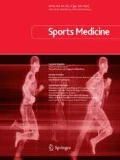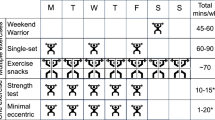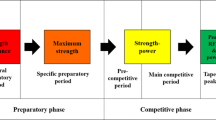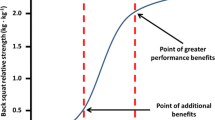Abstract
Background
Caffeine is a widely used ergogenic aid with most research suggesting it confers the greatest effects during endurance activities. Despite the growing body of literature around the use of caffeine as an ergogenic aid, there are few recent meta-analyses that quantitatively assess the effect of caffeine on endurance exercise.
Objectives
To summarise studies that have investigated the ergogenic effects of caffeine on endurance time-trial performance and to quantitatively analyse the results of these studies to gain a better understanding of the magnitude of the ergogenic effect of caffeine on endurance time-trial performance.
Methods
A systematic review was carried out on randomised placebo-controlled studies investigating the effects of caffeine on endurance performance and a meta-analysis was conducted to determine the ergogenic effect of caffeine on endurance time-trial performance.
Results
Forty-six studies met the inclusion criteria and were included in the meta-analysis. Caffeine has a small but evident effect on endurance performance when taken in moderate doses (3–6 mg/kg) as well as an overall improvement following caffeine compared to placebo in mean power output (3.03 ± 3.07%; effect size = 0.23 ± 0.15) and time-trial completion time (2.22 ± 2.59%; effect size = 0.41 ± 0.2). However, differences in responses to caffeine ingestion have been shown, with two studies reporting slower time-trial performance, while five studies reported lower mean power output during the time–trial.
Conclusion
Caffeine can be used effectively as an ergogenic aid when taken in moderate doses, such as during sports when a small increase in endurance performance can lead to significant differences in placements as athletes are often separated by small margins.







Similar content being viewed by others
Change history
09 August 2018
Caffeine is a widely used ergogenic aid with most research suggesting it confers the greatest effects during endurance activities. Despite the growing body of literature around the use of caffeine as an ergogenic aid, there are few recent meta-analyses which quantitatively assess the effect of caffeine on endurance exercise.
References
Christensen PM, Shirai Y, Ritz C, Nordsborg NB. Caffeine and bicarbonate for speed. A meta-analysis of legal supplements potential for improving intense endurance exercise performance. Front Physiol. 2017;8:240.
Del Coso J, Munoz G, Munoz-Guerra J, Muñoz G, Muñoz-Guerra J. Prevalence of caffeine use in elite athletes following its removal from the World Anti-Doping Agency list of banned substances. Appl Physiol Nutr Metab. 2011;36:555–61.
Graham TE. Caffeine and exercise—metabolism, endurance and performance. Sports Med. 2001;31:785–807.
Spriet LL. Exercise and sport performance with low doses of Caffeine. Sports Med. 2014;44:175–84.
Doherty M, Smith PM. Effects of Caffeine ingestion on exercise testing: a meta-analysis. Int J Sport Nutr Exerc Metab. 2004;14:626–46.
Doherty M, Smith PM. Effects of caffeine ingestion on rating of perceived exertion during and after exercise: a meta-analysis. Scand J Med Sci Sports. 2005;15:69–78.
Hopkins WG, Schabort EJ, Hawley JA. Reliability of power in physical performance tests. Sports Med. 2001;31:211–34.
Tarnopolsky MA. Caffeine and endurance performance. Sports Med. 1994;18:109–25.
Spriet LL. Caffeine and performance. Int J Sport Nutr. 1995;5:S84–99.
Powers SK, Dodd S. Caffeine and endurance performance. Sports Med. 1985;2:165–74.
Dodd SL, Herb RA, Powers SK. Caffeine and exercise performance. Sports Med. 1993;15:14–23.
Burke LM. Caffeine and sports performance. Appl Physiol Nutr Metab. 2008;33:1319–34.
Souza DB, Del Coso J, Casonatto J, Polito MD. Acute effects of caffeine-containing energy drinks on physical performance: a systematic review and meta-analysis. Eur J Nutr. 2017;56:13–27.
Ganio MS, Klau JF, Casa DJ, Armstrong LE, Maresh CM. Effect of Caffeine on sport-specific endurance performance: a systematic review. J.Strength Cond Res. 2009;23:315–24.
Moher D, Shamseer L, Clarke M, Ghersi D, Liberati A, Petticrew M, et al. Preferred reporting items for systematic review and meta-analysis protocols (PRISMA-P) 2015 statement. Syst Rev. 2015;4:1.
Kamimori GH, Karyekar CS, Otterstetter R, Cox DS, Balkin TJ, Belenky GL, et al. The rate of absorption and relative bioavailability of caffeine administered in chewing gum versus capsules to normal healthy volunteers. Int J Pharm. 2002;234:159–67.
Maher CG, Sherrington C, Herbert RD, Moseley AM, Elkins M. Reliability of the PEDro scale for rating quality of randomized controlled trials. Phys Ther. 2003;83:713–21.
Hopkins WG, Marshall SW, Batterham AM, Hanin J. Progressive Statistics for Studies in Sports Medicine and Exercise Science. Med Sci Sports Exerc. 2009;41:3–12.
Egger M, Davey Smith G, Schneider M, Minder C. Bias in meta-analysis detected by a simple, graphical test. BMJ [Internet]. Br Med J. 1997;315:629–34.
Astorino TA, Cottrell T, Talhami Lozano A, Aburto-Pratt K, Duhon J. Effect of caffeine on RPE and perceptions of pain, arousal, and pleasure/displeasure during a cycling time trial in endurance trained and active men. Physiol Behav. 2012;106:211–7.
Ganio MS, Johnson EC, Klau JF, Anderson JM, Casa DJ, Maresh CM, et al. Effect of ambient temperature on caffeine ergogenicity during endurance exercise. Eur J Appl Physiol. 2011;111:1135–46.
Mc Naughton LR, Lovell RJ, Siegler JC, Midgley AW, Sandstrom M, Bentley DJ. The effects of caffeine ingestion on time trial cycling performance. J Sports Med Phys Fitness. 2008;48:320–5.
Ivy JL, Costill DL, Fink WJ, Lower RW. Influence of caffeine and carbohydrate feedings on endurance performance. Med Sci Sports. 1979;11:6–11.
Hogervorst E, Riedel W, Kovacs E, Brouns F, Jolles J. Caffeine Improves Cognitive Performance After Strenuous Physical Exercise. Int J Sports Med. 1999;20:354–61.
Anderson ME, Bruce CR, Fraser SF, Stepto NK, Klein R, Hopkins WG, et al. Improved 2000-meter rowing performance in competitive oarswomen after caffeine ingestion. Int J Sport Nutr Exerc Metab. 2000;10:464–75.
Bruce CR, Anderson ME, Fraser SF, Stepto NK, Klein R, Hopkins WG, et al. Enhancement of 2000-m rowing performance after caffeine ingestion. Med Sci Sports Exerc. 2000;32:1958–63.
Bridge CA, Jones MA. The effect of caffeine ingestion on 8 km run performance in a field setting. J Sports Sci. 2006;24:433–9.
Wiles JD, Coleman D, Tegerdine M, Swaine IL. The effects of caffeine ingestion on performance time, speed and power during a laboratory-based 1 km cycling time-trial. J Sports Sci. 2006;24:1165–71.
Clarke ND, Richardson DL, Thie J, Taylor R. Coffee ingestion enhances one-mile running race performance. Int J Sports Physiol Perform. 2017. https://doi.org/10.1123/ijspp.2017-0456.
Kovacs EMR, Stegen JHCH, Brouns F. Effect of caffeinated drinks on substrate metabolism, caffeine excretion, and performance. J Appl Physiol. 1998;85:709–15.
Spence AL, Sim M, Landers G, Peeling P. A comparison of caffeine versus pseudoephedrine on cycling time-trial performance. Int J Sport Nutr Exerc Metab. 2013;23:507–12.
van Nieuwenhoven MA, Brouns F, Kovacs EMR. The effect of two sports drinks and water on GI Complaints And Performance During an 18-km run. Int J Sports Med. 2005;26:281–5.
Hulston CJ, Jeukendrup AE. Substrate metabolism and exercise performance with caffeine and carbohydrate intake. Med Sci Sports Exerc. 2008;40:2096–104.
Hunter AM, St Clair Gibson A, Collins M, Lambert M, Noakes TD. Caffeine ingestion does not alter performance during a 100-km cycling time-trial performance. Int J Sport Nutr Exerc Metab. 2002;12:438–52.
Miller B, O’Connor H, Orr R, Ruell P, Cheng HL, Chow CM. Combined caffeine and carbohydrate ingestion: effects on nocturnal sleep and exercise performance in athletes. Eur J Appl Physiol. 2014;114:2529–37.
Loy BD, O’Connor PJ, Lindheimer JB, Covert SF. Caffeine is ergogenic for adenosine A2A receptor gene (ADORA2A) T allele homozygotes: a pilot study. J Caffeine Res. 2015;5:73–81.
Roelands B, Buyse L, Pauwels F, Delbeke F, Deventer K, Meeusen R. No effect of caffeine on exercise performance in high ambient temperature. Eur J Appl Physiol. 2011;111:3089–95.
Cohen BS, Nelson AG, Prevost MC, Thompson GD, Marx BD, Morris GS. Effects of caffeine ingestion on endurance racing in heat and humidity. Eur J Appl Physiol Occup Physiol. 1996;73:358–63.
MacIntosh BR, Wright BM. Caffeine ingestion and performance of a 1,500-metre swim. Can J Appl Physiol. 1995;20:168–77.
Jacobson TL, Febbraio MA, Arkinstall MJ, Hawley JA. Effect of caffeine co-ingested with carbohydrate or fat on metabolism and performance in endurance-trained men. Exp Physiol. 2001;86:137–44.
Skinner TL, Jenkins DG, Coombes JS, Taaffe DR, Leveritt MD. Dose response of caffeine on 2000-m rowing performance. Med Sci Sports Exerc. 2010;42:571–6.
Bortolotti H, Altimari LR, Vitor-Costa M, Cyrino ES. Performance during a 20-km cycling time-trial after caffeine ingestion. J Int Soc Sports Nutr. 2014;11:45.
Astorino TA, Cottrell T, Lozano AT, Aburto-Pratt K, Duhon J. Ergogenic effects of Caffeine on simulated time-trial performance are independent of fitness Level. J Caffeine Res. 2011;1:179–85.
Potgieter S, Wright HH, Smith C. Caffeine improves triathlon performance: a field study in males and females. Int J Sport Nutr Exerc Metab. 2018. https://doi.org/10.1123/ijsnem.2017-0165.
Stadheim HK, Nossum EM, Olsen R, Spencer M, Jensen J. Caffeine improves performance in double poling during acute exposure to 2000-m altitude. J Appl Physiol. 2015;119:1501–9.
Acker-Hewitt TL, Shafer BM, Saunders MJ, Goh Q, Luden ND. Independent and combined effects of carbohydrate and caffeine ingestion on aerobic cycling performance in the fed state. Appl Physiol Nutr Metab. 2012;37:276–83.
Carr AJ, Gore CJ, Dawson B. Induced alkalosis and caffeine supplementation: effects on 2000-m rowing performance. Int J Sport Nutr Exerc Metab. 2011;21:357–64.
Church DD, Hoffman JR, LaMonica MB, Riffe JJ, Hoffman MW, Baker KM, et al. The effect of an acute ingestion of Turkish coffee on reaction time and time trial performance. J Int Soc Sports Nutr BioMed Central. 2015;12:37.
O’Rourke MP, O’Brien BJ, Knez W, Paton CD. Caffeine has a small effect on 5-km running performance of well-trained and recreational runners. J Sci Med Sport. 2008;11:231–3.
Desbrow B, Barret CM, Minahan CL, Grant GD, Leveritt MD. Caffeine, cycling performance, and exogenous CHO oxidation. Med Sci Sport Exerc. 2009;41:1744–51.
Kilding AE, Overton C, Gleave J. Effects of Caffeine, sodium bicarbonate, and their combined ingestion on high-intensity cycling performance. Int J Sport Nutr Exerc Metab. 2012;22:175–83.
Dean S, Braakhuis A, Paton C. The effects of EGCG on Fat oxidation and endurance performance in male cyclists. Int J Sport Nutr Exerc Metab. 2009;19:624–44.
Bell DG, McLellan TM, Sabiston CM. Effect of ingesting caffeine and ephedrine on 10-km run performance. Med Sci Sports Exerc. 2002;34:344–9.
Astorino TA, Cottrell T, Lozano AT, Aburto-Pratt K, Duhon J. Increases in cycling performance in response to caffeine ingestion are repeatable. Nutr Res. 2012;32:78–84.
Skinner TL, Jenkins DG, Taaffe DR, Leveritt MD, Coombes JS. Coinciding exercise with peak serum caffeine does not improve cycling performance. J Sci Med Sport. 2013;16:54–9.
Womack CJ, Saunders MJ, Bechtel MK, Bolton DJ, Martin M, Luden ND, et al. The influence of a CYP1A2 polymorphism on the ergogenic effects of caffeine. J Int Soc Sports Nutr. 2012;9(1):7.
Desbrow B, Biddulph C, Devlin B, Grant GD, Anoopkumar-Dukie S, Leveritt MD. The effects of different doses of caffeine on endurance cycling time trial performance. J Sports Sci. 2012;30:115–20.
Gonçalves LS, Painelli VS, Yamaguchi G, de Oliveira LF, Saunders B, da Silva RP, et al. Dispelling the myth that habitual caffeine consumption influences the performance response to acute caffeine supplementation. J Appl Physiol. 2017;123:213–20.
Irwin C, Desbrow B, Ellis A, O’Keeffe B, Grant G, Leveritt M. Caffeine withdrawal and high-intensity endurance cycling performance. J Sports Sci. 2011;29:509–15.
Graham-Paulson T, Perret C, Goosey-Tolfrey V. Improvements in cycling but not handcycling 10 km time trial performance in habitual caffeine users. Nutrients. 2016;8:393.
Quinlivan A, Irwin C, Grant GD, Anoopkumar-Dukie S, Skinner T, Leveritt M, et al. The effects of red bull energy drink compared with caffeine on cycling time-trial performance. Int J Sports Physiol Perform. 2015;10:897–901.
de Santos R, Dal Molin P, Kiss MA, Silva-Cavalcante MD, Correia-Oliveira CR, Bertuzzi R, Bishop DJ, et al. Caffeine Alters Anaerobic Distribution and Pacing during a 4000-m Cycling Time Trial. PLoS One. 2013;8:e75399.
Glaister M, Pattison JR, Muniz-Pumares D, Patterson SD, Foley P. Effects of dietary nitrate, caffeine, and their combination on 20-km cycling time trial performance. J Strength Cond Res. 2015;29:165–74.
Walker GJ, Dziubak A, Houghton L, Prendergast C, Lim L, Bishop NC. The effect of caffeine ingestion on human neutrophil oxidative burst responses following time-trial cycling. J Sports Sci. 2008;26:611–9.
Pitchford NW, Fell JW, Leveritt MD, Desbrow B, Shing CM. Effect of caffeine on cycling time-trial performance in the heat. J Sci Med Sport. 2014;17:445–9.
Stadheim HK, Kvamme B, Olsen R, Drevon CA, Ivy JL, Jensen J. Caffeine increases performance in cross-country double-poling time trial exercise. Med Sci Sport Exerc. 2013;45:2175–83.
Hodgson AB, Randell RK, Jeukendrup AE. The Metabolic and Performance Effects of Caffeine Compared to Coffee during Endurance Exercise. PLoS One. 2013;8:59561.
Felippe LC, Ferreira GA, Learsi SK, Boari D, Bertuzzi R, Lima-Silva AE. Caffeine increases both total work performed above critical power and peripheral fatigue during a 4-km cycling time trial. J Appl Physiol. 2018. https://doi.org/10.1152/japplphysiol.00930.2017.
Cox GR, Desbrow B, Montgomery PG, Anderson ME, Bruce CR, Macrides TA, et al. Effect of different protocols of caffeine intake on metabolism and endurance performance. J Appl Physiol. 2002;93:990–9.
Conway KJ, Orr R, Stannard SR. Effect of a divided caffeine dose on endurance cycling performance, postexercise urinary caffeine concentration, and plasma paraxanthine. J Appl Physiol. 2003;94:1557–62.
Guest N, Corey P, Vescovi J, El-Sohemy A. Caffeine, CYP1A2 genotype, and endurance performance in Athletes. Med Sci Sports Exerc. 2018. https://doi.org/10.1249/MSS.0000000000001596.
Christensen PM, Petersen MH, Friis SN, Bangsbo J. Caffeine, but not bicarbonate, improves 6 min maximal performance in elite rowers. Appl Physiol Nutr Metab. 2014;39:1058–63.
Black CD, Waddell DE, Gonglach AR. Caffeine’s ergogenic effects on cycling: Neuromuscular and perceptual factors. Med Sci Sports Exerc. 2015;47(6):1145–58.
Saunders B, de Oliveira LF, da Silva RP, de Salles Painelli V, Gonçalves LS, Yamaguchi G, et al. Placebo in sports nutrition: a proof-of-principle study involving caffeine supplementation. Scand J Med Sci Sports. 2017;27(11):1240–7.
Wallman KE, Goh JW, Guelfi KJ. Effects of caffeine on exercise performance in sedentary females. J Sport Sci Med. 2010;9:183–9.
Beaumont RE, James LJ. Effect of a moderate caffeine dose on endurance cycle performance and thermoregulation during prolonged exercise in the heat. J Sci Med Sport. 2017;20(11):1024–8.
Ganio MS, Johnson EC, Lopez RM, Stearns RL, Emmanuel H, Anderson JM, et al. Caffeine lowers muscle pain during exercise in hot but not cool environments. Physiol Behav. 2011;102:429–35.
Laurence G, Wallman K, Guelfi K. Effects of caffeine on time trial performance in sedentary men. J Sports Sci. 2012;30:1235–40.
Collomp K, Candau R, Millet G, Mucci P, Borrani F, Préfaut C, et al. Effects of salbutamol and caffeine ingestion on exercise metabolism and performance. Int J Sports Med. 2002;23:549–54.
Jenkins NT, Trilk JL, Singhal A, O’Connor PJ, Cureton KJ. Ergogenic effects of low doses of caffeine on cycling performance. Int J Sport Nutr Exerc Metab. 2008;18:328–42.
Loy BD, O’Connor PJ, Lindheimer JB, Covert SF. Caffeine is ergogenic for adenosine A 2A receptor gene (ADORA2A) T allele homozygotes: a pilot Study. J Caffeine Res. 2015;5:73–81.
Hopkins WG. How to interpret changes in an athletic performance test. Sportscience. 2004;8:1–7.
Magkos F, Kavouras SA. Caffeine Use in Sports, Pharmacokinetics in Man, and Cellular Mechanisms of Action. Crit Rev Food Sci Nutr. 2005;45:535–62.
Chung W, Kang J, Park C, Cho M, Cha Y. Effect of age and smoking on in vivo CYP1A2, flavin-containing monooxygenase, and xanthine oxidase activities in Koreans: determination by caffeine metabolism. Clin Pharmacol Ther. 2000;67:258–66.
Abernethy DR, Todd EL. Impairment of caffeine clearance by chronic use of low-dose oestrogen-containing oral contraceptives. Eur J Clin. 1985;28:425–8.
Yang A, Palmer AA, de Wit H. Genetics of caffeine consumption and responses to caffeine. Psychopharmacology (Berl). 2010;211:245–57.
Guengerich FP. Cytochrome P450 and Chemical Toxicology. Chem Res Toxicol. 2008;21:70–83.
Butler MA, Iwasakit M, Guengericht FP, Kadlubar FF. Human cytochrome P-450PA (P-450IA2), the phenacetin O-deet-hylase, is primarily responsible for the hepatic 3-demethylation of caffeine and N-oxidation of carcinogenic arylamines. Biochemistry. 1989;86:7696–700.
Sachse C, Brockmöller J, Bauer S, Roots I. Functional significance of a C → A polymorphism in intron 1 of the cytochrome P450 CYP1A2 gene tested with caffeine. Br J Clin Pharmacol. 1999;47:445–9.
Ghotbi R, Christensen M, Roh H-K, Ingelman-Sundberg M, Aklillu E, Bertilsson L. Comparisons of CYP1A2 genetic polymorphisms, enzyme activity and the genotype-phenotype relationship in Swedes and Koreans. Eur J Clin Pharmacol. 2007;63:537–46.
Djordjevic N, Ghotbi R, Jankovic S, Aklillu E. Induction of CYP1A2 by heavy coffee consumption is associated with the CYP1A2 −163C > A polymorphism. Eur J Clin Pharmacol. 2010;66:697–703.
Desbrow B, Leveritt M. Awareness and Use of Caffeine by Athletes Competing at the 2005 Ironman Triathlon World Championships. Int J Sport Nutr Exerc Metab. 2006;16:545–58.
IAAF.ORG. IAAF Top Lists Half marathon [Internet]. [cited 2017 Nov 12].
Acknowledgements
The present article presents material that has not been submitted for publication elsewhere. The authors declare no conflict of interest.
Author information
Authors and Affiliations
Corresponding author
Ethics declarations
Funding
No funding was received for this work.
Conflict of interests
The authors Kyle Southward, Ajmol Ali, and Kay Rutherfurd-Markwick declare that they have no competing interests to declare in relation to this manuscript.
Rights and permissions
About this article
Cite this article
Southward, K., Rutherfurd-Markwick, K.J. & Ali, A. The Effect of Acute Caffeine Ingestion on Endurance Performance: A Systematic Review and Meta–Analysis. Sports Med 48, 1913–1928 (2018). https://doi.org/10.1007/s40279-018-0939-8
Published:
Issue Date:
DOI: https://doi.org/10.1007/s40279-018-0939-8




